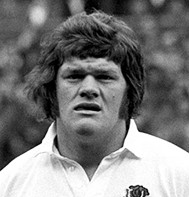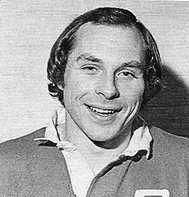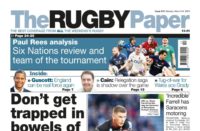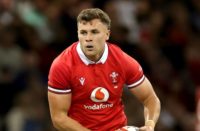HE days of a first choice Test prop captaining his national Seven to a ‘world title' are probably long gone but that's what happened back in 1973 when the Scottish Rugby Union, celebrating their Centenary, staged the inaugural world invitational Sevens tournament.
The Scots invited Wales, Ireland, England, New Zealand, France and Australia to join them and an all-star Presidents VII based around some of the biggest names in South African and Scottish rugby to join them in a jamboree of Sevens at Murrayfield. Two groups of four with the winners playing in a Grand Final. At which point Fran Cotton, for it was he captaining England, should probably take over the narrative.
“We were underdogs but we still fancied our chances. Possession is everything in Sevens, so we picked three specialist forwards. Myself and hooker John Gray were there to make sure we won all our scrums and disrupted the opposition scrums and it helped that we were both pretty quick around the park and useful ball handlers, particularly John. He was a massive talent and would have been a major England player had he not turned to League.
“We had Andy Ripley to win the line-outs and he was nearly as quick as our speedster Keith Fielding. And then you add into the equation my old mate Steve Smith at scrum-half and the Coventry trio of Peter Preece, Peter Rosborough and David Duckham and we had some squad, even if David did a hammie in the first match.
“The other big factor was although there was almost no preparation, we had a core of four of us from Loughborough – myself, Smithy, Johny Gray and Keith –who had played a fair bit of Sevens together.”
England started with a 22-0 win over France and then came through a tough encounter with the President VII –which included Jan Ellis and Piet Greyling plus Scottish magicians Andy Irvine and Jim Renwick –winning 24-16. That set up a pool decider against all conquering Wales who had thrashed France 36-4 and destroyed the Presidents VII 30-10.
Wales were fielding what on paper looked like the greatest Sevens team ever seen. The back division read Gareth Edwards, Phil Bennett, Gerald Davies and JJ Williams while the forwards were JPR Williams, John Taylor and Mervyn Davies. Enough said.
“There was – and is – only one way you can ever play against such an all-star line-up and that is to make sure they never ever get the ball,” continues Cotton. “And that's exactly what we did. We won every lineout and scrum, every 50-50 ball on the ground and then played keep ball when we had it.
“To general shock and amazement, we bossed it from start to finish and won 24-10 with Gareth scoring a late try down the blindside to make it look closer than it actually was.
“As somebody who played for England through the 70s when we had just one win over Wales – in 1974 which I missed out on – let's just say it was a sweet moment.
“Keith Fielding was an amazing talent who, alas, England never saw the best of. Talk about quick and explosive. I was at Loughborough one afternoon doing some fitness on the track and Keith wandered over the long jump pit where we had a couple off GB jumpers training. He casually measured out a run of sorts, sprinted up and landed a Commonwealth Games qualifying leap. Of course, he went off to Rugby League and also won various superstars competitions on TV.
“In that Wales game Keith did Gerald for sheer pace to score one try while in the final he scored one of the best Sevens tries I ever saw. He stopped in his tracks, stood up Vinnie Becker – the all-Ireland sprint champion – and did him on the outside like he wasn't there, sprinting 70 yards to the tryline. Untouchable from a standing start.”
In the final England came up against a very strong Ireland team who featured Fergus Slattery – probably the only forward in world rugby who could match Ripley's pace –Mike Gibson and JP Dennison who was almost as quick as Becker, while, like England, they also opted for specialist forwards with hooker Pat Whelan and rangy No.8 Terry Moore.


The lead up to the final was bizarre. A last-minute change of scheduling by BBC Grandstand –who were televising the whole event live which was unusual for those days – meant the final was brought forward half an hour and England had to start just ten minutes after their semi-final with Wales. Cotton wasn't happy but was too out of breath to complain.
Then, after a cloudy but unremarkable April afternoon in Edinburgh, the city was suddenly hit by a brief unexpected snowstorm just as the two finalists ran out.
“Ireland were a hell of a good team, we had to dig very deep to get over the line against them,” says Cotton.
“Keith got that special try and the other abiding memory for me was Rippers sprinting away from the great Mike Gibson for a try. I felt sorry for Gibbo. Once Rippers opened up that big stride there was almost nobody in the game who could catch him, not even one of the world's great backs.
“Wonderful days. Looking back it would have been nice to have played in a few more international Sevens tournaments but although Murrayfield was considered a huge success for some reason there was no follow up, well not until 1993. Rugby missed a trick there although finding the time in the amateur era was always the challenge. “And in all seriousness that tournament was a bit of a boost for some of us.
English rugby was very up and down in those days but a few weeks later myself, Rippers, Peter Preece, David Duckham and Peter Rosborough all played in the England team that beat New Zealand 16-10 in Auckland. If nothing else, we arrived in New Zealand very fit and fearing nobody which is always a decent start.”



























